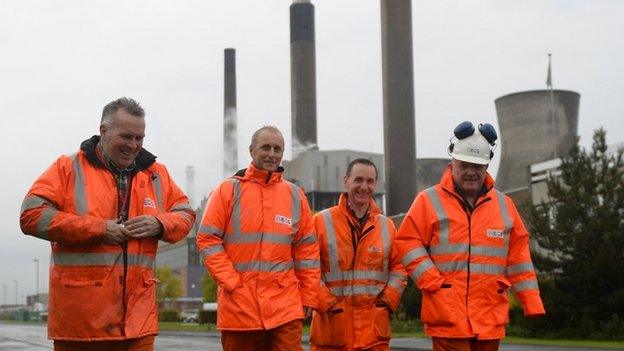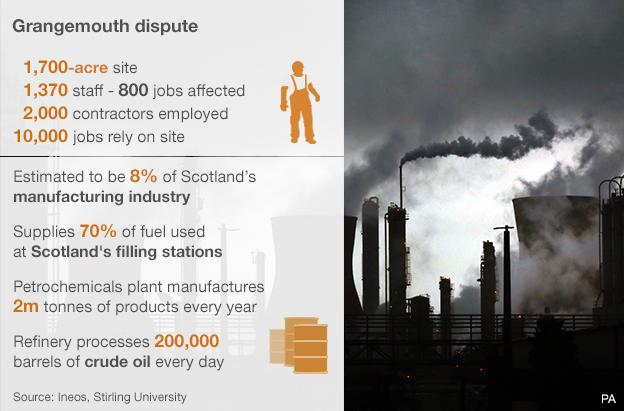Grangemouth start-up 'will take two to three weeks'
- Published

Workers welcomed the reversal of the decision to close the petrochemical plant
The Grangemouth oil refinery and petrochemicals plant will take "two to three weeks" to fully reopen, the site manager has said.
Gordon Grant was speaking the day after operators Ineos reversed its decision to close the petrochemicals site.
Mr Grant said the company's biggest concern was ensuring the plant, which was shut down 12 days ago, was recommissioned safely.
On Friday, Ineos said the chemical plant would remain open.
The decision came after the Unite union made significant concessions.
Two days earlier Ineos had announced that the plant was to shut completely, with the loss of 800 jobs, after union members rejected the company's survival plan.
But that decision was reversed after the union agreed to Ineos's conditions, which included changes to pension arrangements, a three-year pay freeze and a promise not to strike for three years.
The petrochemical plant and the nearby refinery had been shut down for almost two weeks as the row escalated.
Mr Grant, the site manager for Ineos at Grangemouth, told the BBC it would take some time to get the site fully operational again.
"We would expect the full commissioning of the site to take two to three weeks, he said.
"It's a very integrated site, with stock and raw materials going into one plant, producing products which then feed into another plant. So the sequence has a chain where we move from one plant to another plant.
"There's nothing coming out of the petrochemical plant. There are some fuels coming out of the refinery, but low volumes. We will start to see chemical products probably towards the end of next week, with full chemical production the week after.
"That's similar to the refinery - we'll start to see products emerging and growing as we go through the week, with the full refinery being up and running in two to three weeks.
"Safety is the most important thing for us at the moment."
Ineos founder and chairman Jim Ratcliffe said the union's acceptance of the company's proposal for new conditions was "a victory for common sense".
He confirmed Ineos would now press ahead with plans to invest £300m in a new gas terminal at the site.
The announcement on Grangemouth's future was greeted by huge cheers from the workforce, who had gathered at the plant to be told the news.
Mr Grant said he was confident that relations between Ineos, employees at the site and the union would recover.
"This is a new start for Grangemouth, a start that modernises Grangemouth, with new materials, new equipment and a project worth £300m," he said.
"And it's also a time for a new, modern way of communicating and consulting with our employees. And that's what we want to do going forward, we want to be talking to our employees about investment and about how we improve our operations and maintenance."
The main points of the Ineos announcement on Friday included:
Ineos will begin to reopen the petrochemical plant and oil refinery at Grangemouth immediately
Ineos has undertaken to invest £300m at the Grangemouth site on a gas terminal to handle shale gas brought in from America
Workers agreed to a three-year pay freeze
The union agreed not to stage strikes at the plant for three years until the new gas terminal is built
Changes will be made to current staff pension arrangements
Up to 2,000 contractors who were laid off after the complex was shut will be re-hired
